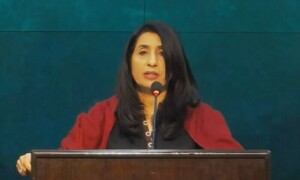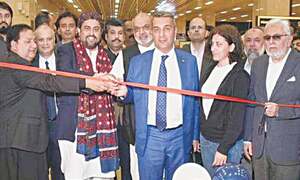The Sindh cabinet on Monday green-lighted a proposed bill that seeks to lift the ban on student unions in the educational institutions of the province.
Approved in a meeting chaired by Sindh Chief Minister Murad Ali Shah, the Sindh Students Union Act, 2019, aims at activating "an effective system to provide for the establishment of students unions and regulating them in the province of Sindh", according to a copy of the draft law seen by Dawn.com.
A ban on student unions across the country was imposed by General Ziaul Haq’s military regime in January 1984. However, they were banned in Sindh even earlier in 1979, when automatic weapons first surfaced in Pakistan, and on university campuses in Karachi and Lahore.
Examine: The case for student unions
According to the draft bill, there will be a student union in every educational institution consisting of bona fide students of that institution. The union will be made up of 7-11 members elected by the students of each university or college in polls to be held every year.
Within two months of the enactment of this law, each educational institution will formulate its own rules and procedures for the conduct of their student union.
Every university or college will have at least one nominee of the elected student union in its syndicate, senate or board, according to the draft law.
The bill also binds educational institutions to constitute a committee for protection against harassment which will be gender balanced and have at least one nominee of the elected student union.
As per the draft, the student union will be a bona fide representative body of the students of the respective educational institution and it shall, among other things:
- Work for maintaining social and academic welfare of the students
- Ensure the rights and interests of all students are suitably represented and protected
- Organise such social, cultural, intellectual or other extra-curricular events which help in forming a student's personality and make them responsible citizens
- Promote and strengthen relations between students and educational Institutions
- Oppose and bring to light any discrimination or injustice that obstructs the social and academic life of students
- Endeavour to make students responsible citizens, aware of their rights and obligations towards their country as provided under the Constitution
- Play the role of a bridge between the students, the educational institution and its staff to further the objective of academic excellence
- Coordinate and liaison with elected students bodies of different jurisdictions in the country
- Assist the educational institution in maintaining discipline and ensure the respect of teachers as well as staff of the educational institution is not compromised
- Ensure democratic and inclusive atmosphere for healthy debate that respects others' opinions.
Under the rules, the students have been barred from indulging in any "prejudicial activity" and possessing or carrying within the premises of an educational institution any firearm, ammunition or explosives.
The head of the educational institution will have the power to expel or rusticate a student as well as restrict the entry of any person to the campus. However, a "proper opportunity of hearing" will be given to the concerned student before such an order is passed.
In addition, any person aggrieved by such an order will be able to file an appeal to the chief minister or a person nominated by him within 15 days. The order of the chief minister or his representative will be final.
Earlier in November, the Sindh Assembly had unanimously passed a resolution that asked the provincial government to lift the ban on student unions in the educational institutions of Sindh by introducing a code of conduct that may help avoid conflict among various student organisations in the future.
The bill has been referred to the Sindh Assembly for introduction; it will then be sent to the Standing Committee on Law for further deliberations. It will be put before the house for voting after consultation with stakeholders.
















































